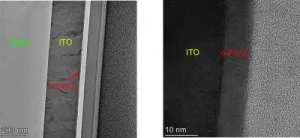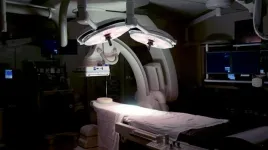INFORMATION:
In addition to Dr. Murray, authors affiliated with Mayo are Angela Crist, Ph.D.; Xue Wang, Ph.D.; Christina Moloney, Ph.D.; Billie Matchett; Sydney Labuzan; Zachary Quicksall; Tulsi Patel, Ph.D.; Michael DeTure, Ph.D.; Xiaojia Tang, Ph.D.; Ronald Petersen, M.D., Ph.D.; Neill Graff-Radford, M.D.; Minerva Carrasquillo, Ph.D.; Hu Li, Ph.D.; Owen Ross, Ph.D.; Nilufer Taner, M.D., Ph.D.; Dennis Dickson, M.D.; Yan Asmann, Ph.D.; and Rickey Carter, Ph.D. Author Ranjan Duara, M.D., is affiliated with the Wien Center for Alzheimer's Disease and Memory Disorders at Mount Sinai Medical Center in Florida.
Funding for this study was provided by the New Vision Award, National Institute on Aging, the Alzheimer's Association, Florida Department of Health, the Ed and Ethel Moore Alzheimer's Disease Research program, and a gift from David and Frances Strawn. For the full author list, disclosure information and a complete list of those who funded the study, see the published paper.
About Mayo Clinic
Mayo Clinic is a nonprofit organization committed to innovation in clinical practice, education and research, and providing compassion, expertise and answers to everyone who needs healing. Visit the Mayo Clinic News Network for additional Mayo Clinic news. For information on COVID-19, including Mayo Clinic's Coronavirus Map tracking tool, which has 14-day forecasting on COVID-19 trends, visit the Mayo Clinic COVID-19 Resource Center.
Mayo researchers, collaborators identify 'instigator' gene associated with Alzheimer's disease
2021-04-19
(Press-News.org) JACKSONVILLE, Fla. -- In a new paper published in Nature Communications, Mayo Clinic researchers and collaborators report the protein-coding gene SERPINA5 may worsen tau protein tangles, which are characteristic of Alzheimer's disease, and advance disease. By combining clinical expertise, brain tissue samples, pathology expertise and artificial intelligence, the team clarified and validated the relevance of the gene to Alzheimer's disease.
The researchers used tissue samples from 385 brains donated to the Mayo Clinic Brain Bank, which houses more than 9,000 brain tissue specimens for the study of neurodegenerative disorders. The samples were from people who were diagnosed with Alzheimer's disease and lacked co-existing diseases found in the brain. This ensured a spotlight on Alzheimer's disease, which enabled the team to focus on targets relevant to the disease.
These samples were used to classify the pattern of protein tangles associated with Alzheimer's. Then the team used digital pathology and RNA sequencing to identify gene expression in the samples, which effectively measures gene changes responsible for instructing proteins.
"We were able to look at an entire disease spectrum and find gene changes that may really influence the hippocampus, the brain's memory center," says Melissa Murray, Ph.D., a Mayo Clinic translational neuropathologist and lead author on the paper. "That means we may have targets that indicate why some people have relative preservation and some people have relative exacerbation of memory loss symptoms."
Using a machine learning algorithm, the authors narrowed the genes of interest from about 50,000 to five. The top candidate, SERPINA5, was found to be strongly associated with tau tangle progression in the hippocampus and cortex of the samples. The researchers plan to investigate how SERPINA5 interacts with tau protein to develop an inhibitor.
"Much of the focus of therapeutics is on abnormal proteins ? amyloid and tau ? used to biologically define Alzheimer's disease," says Dr. Murray. "But we hope to take a step back to look at a new interacting partner that may be actually accelerating tau or pushing tau accumulation past the tipping point."
Based on a growing understanding of how Alzheimer's disease may affect people at different ages, or differences observed between women and men, the study team did not limit their investigation by adjusting for age and sex.
The team was recently awarded a grant by the state of Florida to ensure the findings are broadly applicable across an ethno-racially diverse Alzheimer's disease cohort, as the need for more research to clarify the relevance of gene expression changes on hippocampal vulnerability may be critical for preserving memory loss in Alzheimer's disease. But, Dr. Murray says, by starting with the human brain and ending with it, the researchers hope their findings provide a deeper level of understanding that helps advance findings to clinical trials faster.
"While we have direct evidence of SERPINA5 in the context of Alzheimer's disease, SERPINA3 in this same family of genes has also been looked at in Alzheimer's, and SERPINA1 in ALS. So I think it's about collective awareness and paying attention to this group of proteins."
ELSE PRESS RELEASES FROM THIS DATE:
Green hydrogen: "Rust" as a photoanode and its limits
2021-04-19
Hydrogen will be needed in large quantities as an energy carrier and raw material in the energy system of the future. To achieve this, however, hydrogen must be produced in a climate-neutral way, for example through so-called photoelectrolysis, by using sunlight to split water into hydrogen and oxygen. As photoelectrodes, semiconducting materials are needed that convert sunlight into electricity and remain stable in water. Metal oxides are among the best candidates for stable and inexpensive photoelectrodes. Some of these metal oxides also have catalytically active surfaces that accelerate the formation of hydrogen at the cathode or oxygen at the anode.
Why is rust not much better?
Research has long focused on haematite (α-Fe2O3), ...
Microglia, Stockholm syndrome and miraculous cures in glioblastoma patients
2021-04-19
MINNEAPOLIS - April 19, 2021 - Despite access to some of the best possible medical care in the world, Senators John McCain and Edward Kennedy both died within 18 months of their diagnosis of glioblastoma, an aggressive form of brain cancer. While this deadly outcome typifies the nature of this disease, some glioblastoma patients see exceptional benefits from chemotherapy and survive beyond expectations. Why this happens has been revealed by researchers at the University of Minnesota in a new study published in the Proceedings of the National Academy of Sciences.
"Deciphering the molecular underpinning of these exceptional ...
Delaying cardiovascular surgeries due to COVID-19 has psychological effects on patients
2021-04-19
In March 2020, when the pandemic hit, everything slowed, including non-essential medical procedures such as elective surgeries, to reduce the spread of the coronavirus.
Six weeks later, Mary Byrnes, Ph.D., an assistant research scientist in the Department of Surgery at Michigan Medicine, began calling University of Michigan Frankel Cardiovascular Center patients whose surgeries had been canceled or delayed. She wanted to hear about their experiences -- what undergoing surgery meant to them, how postponing their operations had affected them, whether the existence of the coronavirus complicated how they felt about their bodies and ...
New factor in the development of psoriasis discovered
2021-04-19
Psoriasis is a common inflammatory skin condition. The underlying genetic factors have not yet been sufficiently researched. The skin inflammation is usually triggered by external factors such as infections or stress. A research team at the Institute of Cancer Research of the Medical University of Vienna has now managed to identify a new factor in signal transmission of the immune system that plays a major role in the development of a psoriatic episode. The scientists have shown that symptoms can be alleviated by inhibiting the "c-Jun" protein in signal transmission.
The common clinical manifestation of psoriasis is a pinkish-grey thickening of the epidermis in distinct foci of infection, ...
SARS-CoV-2 variants from mink evade inhibition by antibodies
2021-04-19
It has been known for about a year that minks can become infected with SARS-CoV-2. The virus had been transmitted from humans to farmed mink and mutated in infected animals. Mutations were acquired in the spike protein, which is crucial for the entry of the virus into host cells and represents the central point of attack for antibodies. These SARS-CoV-2 variants from mink were transmitted back to humans, raising concerns that minks could be a continuing source of infection of humans with SARS-CoV-2 variants with altered biological properties. Researchers at the German Primate Center (DPZ) - Leibniz Institute for Primate Research in Göttingen, Germany, have now shown that an antibody used for COVID-19 ...
Supplement treats schizophrenia in mice, restores healthy "dance" and structure of neurons
2021-04-19
A simple dietary supplement reduces behavioral symptoms in mice with a genetic mutation that causes schizophrenia. After additional experiments, including visualizing the fluorescently stained dancing edge of immature brain cells, researchers concluded that the supplement likely protects proteins that build neurons' cellular skeletons.
The supplement betaine was first isolated from sugar beets and is often associated with sweetness or umami flavor. Healthy levels of betaine come from both external food sources and internal synthesis in the body. Betaine ...
Beetles that pee themselves to death could be tomorrow's pest control
2021-04-19
Up to 25 percent of global food production is lost annually due to insects, primarily beetles. For the past 500 million years, beetles have successfully spread and adapted to life around the globe and now account for one of every five animal species on Earth. Yet as far back as ancient Egypt, these tough little bugs have invaded granaries and vexed us humans by destroying our crops.
As a result, food production and an abundant use of pesticides now go hand in hand. A large share of these pesticides damage biodiversity, the environment and human health. As various pesticides are phased out, new solutions are required to target and eradicate pests without harming humans or beneficial ...
UK waters are home again to the bluefin tuna
2021-04-19
Atlantic bluefin tuna have returned to UK waters and can once again be seen during the summer and autumn months.
Their numbers appear to be increasing, following a long period of absence linked to population decline, according to research led by Cefas and the University of Exeter.
Marine scientists in the UK and Ireland have analysed multiple datasets, spanning a 16-year period, to document the increase in bluefin, which arrive into the waters of the Celtic Seas and off South West England, the Scilly Isles, and North West Ireland to feed in late summer and autumn.
The research is part of the Defra-funded "Thunnus UK" research project. ...
Traumatic brain injuries can increase risk of stroke for up to five years, finds study
2021-04-19
Stroke risk for patients with traumatic brain injuries is at its highest in the four months following injury and remains significant for up to five years post-injury, finds a new systematic review led by a team at the University of Birmingham.
Traumatic brain injury (TBI) is a global health problem affecting over 60 million people a year worldwide. Incidences of TBI are rising due to a range of factors including increased falls in the elderly, military conflict, sports injuries and road traffic accidents. However, advances in critical care and imaging have led to a reduction in TBI-related mortality.
Previous studies have associated TBI with a long-term risk of neurological diseases including dementia, ...
Defects in a specific cell type may cause ulcerative colitis
2021-04-19
There are many variants of "goblet cells" in the intestines and they seem to have different functions, according to a new study from the University of Gothenburg. The study indicates that defects in goblet cells of a particular type may be a factor contributing to ulcerative colitis, an inflammatory bowel disease.
The entire inside of our intestines is covered by a thin layer of mucus that protects the fragile mucous membrane (mucosa) from bacteria and other microorganisms. If the microorganisms repeatedly come into contact with the intestinal mucosa, inflammation and even cell changes may result. These increase the risk of intestinal cancer. In a healthy colon, the mucus layer is up to a millimeter ...


